
Lottery is a form of gambling in which people attempt to win prizes based on the drawing of numbers. Prizes may be money or goods. Many states have state-run lotteries to raise money for public services, including education. In addition, some private companies operate lotteries to raise funds for charitable causes. Some critics have argued that lotteries are harmful to the economy and should be abolished, while others argue that they serve a useful social purpose. Regardless, lottery is a form of gambling and is not suitable for everyone. Some people have serious problems with gambling, and it is important to be aware of the risks associated with lottery play.
The lottery has a long history in Europe and is often seen as a painless form of taxation. It was widely used in ancient Rome and later in England and the American colonies, where it raised money for everything from paving streets to building churches. Today, lotteries are a popular way to spend time and money, but they can be dangerous if you don’t know the odds.
Despite the high stakes, winning the lottery is still very unlikely. In fact, you’re more likely to be struck by lightning or die in a car crash than you are to win the jackpot. This is because the probability of winning the lottery depends on a number of factors. One of the most important factors is the number of possible combinations. The more combinations there are, the less likely you will win. Another factor is the number of tickets sold. This is why the lottery is considered a game of chance and not skill.
The odds of winning the lottery are influenced by a number of factors, such as the type of numbers and the amount of cash in the pot. The odds are also determined by the number of participants and how they select their numbers. If you want to improve your chances of winning, try selecting non-consecutive numbers or numbers that don’t appear in the first 31. You can also use a lottery app to help you pick your numbers.
Lotteries are a source of revenue for the government and have gained widespread popularity in recent years. However, they do not necessarily provide a return on investment for the state, and some experts have raised concerns about their role in an anti-tax era. In addition, lotteries are often promoted by politicians as a source of “painless” revenues, and they are a popular way to avoid raising taxes. As a result, there are tensions between voters who want the state to spend more and legislators who view lotteries as a form of taxation without the political risk of raising taxes. This puts the state at cross-purposes with the public interest.